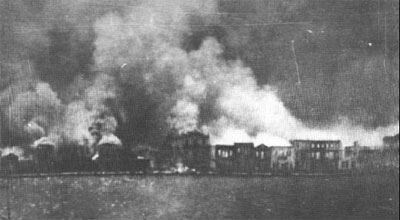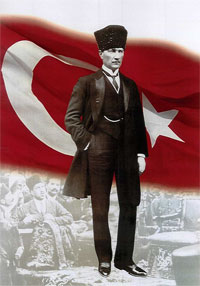Okay, obviously this is taking the romantic pipe dreams of Greek nationalists at their word to create an AH wargaming scenario, but how much of this could have happened had the king not died of a monkey's bite?
The Monkey Bite That Changed History
The Monkey Bite That Changed History
Obviously, the Byzantine part can just be discarded as flavor. But suppose the Allies continued to support Alexander I. How far could the Greeks have gotten? Could they have landed in Crimea and could the Bolsheviks have deigned to fight them, as they left the Romanians alone in Bessarabia? Would the Italians allow them to get Northern Epirus?The Monkey Bite
That Changed History
A few weeks ago, we included among our daily content what we consider the weirdest game variant we’ve ever had requested: a Byzantine Empire still extant in 1939. Such a thing was simply not possible without completely altering Western history; but gamers, they want their purple panzers.
This more extensive variant looks at a far more likely historical alternative (moreso than the actual outcome), as a variant for our Third Reich game.
While the Eastern Roman Empire died an overdue death in 1453, in the 1920s there were Greek nationalist dreamers who made a pretty serious attempt to revive it. Or at least a semblance of it; while the Empire’s political system would remain dead, they hoped to greatly enlarge the Greek state.

Alexander I. Killed by a monkey bite.
Yes, really.
The result was a vicious war fought in Anatolia between the Greek regular army and the Turkish nationalist forces of Mustafa Kemal, soon to be re-named Ataturk. The Greeks landed at Smyrna in May 1919 with Allied support, but this disappeared in October when King Alexander died of sepsis after being bitten by his pet monkey, and his father, Constantine, resumed the throne. Constantine had favored the Central Powers during the First World War and lost his throne in a French-sponsored coup. Despite the loss of foreign aid, Constantine continued the war for three more years. Kemal’s “Büyük Taarraz” offensive in the late summer of 1922 drove the Greeks out of Anatolia. Peace was finally made in July, 1923 but deep hostility between the two nations remains to this day.
To fulfill their wildest dreams, the Greeks would have required a resounding military victory in Anatolia, political harmony among their own leaders, acceptance of their dreams by the Bolshevik faction in the Russian Civil War, and cooperation form the French, British and Italians. Of those six pre-requisites, they achieved zero. Without the monkey’s bite, all of them were possible.

Constantine I. Restored by the monkey’s bite.
Romania and Serbia managed to fulfill equally ridiculous claims, so it’s not completely out of bounds to posit Greek success under different leadership. It’s certainly no more odd an outcome than the historical one, with Kemal forging a united, secular Turkey out of the Ottoman debris. Had something happened to the Father of Turks even with the monkey’s bite, this outcome is far more likely than the birth of modern Turkey.
Greater Greece at its greatest extent would include:
• Western Thrace. The southern coast of Bulgaria, hexes 2922 and 3021 on the Third Reich map. Greece actually acquired this region.
• The Dodecanese Islands. Taken from Turkey by Italy in 1912, these consisted of Rhodes (hex 3524) and some smaller islands in 3324 and 3424 that are not shown at the scale of Third Reich. Italy agreed to hand these over to Greece following the First World War, but reneged during the Corfu crisis. These islands did become part of Greece after the Second World War.
• Eastern Thrace. The European part of Turkey, including Constantinople (Istanbul). The Allied powers wavered on this one; they preferred not to see the Greeks acquire the ancient capital but were no more eager to give it back to the Turks. This would have been an enormous coup for any Greek government, but a Greek annexation of the great city would doubtlessly have led to rioting and massacre in its streets.
• Ionian Greece. The eastern shore of the Aegean, centered on the commercial center of Smyra (Izmir). The Greek expulsion from Smyrna led to widespread massacres by the victorious Turkish army. On the Third Reich map, this region would include hexes 3221, 3322, 3323 and 3423.
• Cyprus. Britain took over “administration” of the island in 1878, and annexed it outright in 1914 when war broke out with Turkey. The Greeks did not press “enosis,” or union between Greece and Cyprus, very hard at the time, but every Greek government since 1820 has cast its eye at the lovely island. And there was precedent for British gifts of territory, as the “Seven Isles” including Corfu had been transferred from Britain to Greece in 1863.
• Crimea. This goal lay only in the eyes of the truly insane among the Greek leaders. Unfortunately for Greece, in the early 1920s this definition covered most of them. A large minority known as “Pontic Greeks” lived in Crimea and on the northeastern shores of the Black Sea, numbering over a million at the time. Many of these people were forcibly expelled in the 1960s and 1970s and settled in Western Thrace. Two Greek divisions fought alongside the French interventionists in Ukraine during the Russian Civil War, and as a reward some in Greece hoped to claim the Crimean peninsula, on the grounds of the Pontic Greek presence and its historical standing as breadbasket of ancient Greece.
In early 1921 Budenny’s Konarmiya stormed the Parpach Isthmus separating the Crimea from the Ukrainian mainland, and captured the peninsula from the White faction. Would they have done the same had it been held by Greeks? The Red Army avoided confrontation with the Romanian army over Bessarabia, despite the desires of some to fight for all of the old empire. For the purposes of this variant, we’ll assume the same policy holds true. The Crimea consists of hexes 3213, 3214, 3314, 3315, 3316 and 3413.
• Northern Epirus. Some Greeks still haven’t given up on this one, a claim to parts of what today is southern Albania on ethnic grounds. Albania could not have stood up to those claims, had Italy allowed them, and since we’ve already posited Italian connivance in creation of Greater Greece, this is one of the easier conquests. On the Third Reich map, this region comprises hex 2724.
Greater Greece would not have been a stable state. It’s likely that the expulsions of its Turkish minority would have been carried out as they were in reality. In some of these areas, Turks would have been the majority. These territories would increase Greek economic potential, but given the political weaknesses of such a far-flung empire we’ll assign each a BRP value and allow them to be conquered individually:
• The Crimea is worth 5 BRP’s with its capital at Sevastopol. Sevastopol remains a fortress and an objective.
• Cyprus is worth 2 BRP’s with its capital at Famagusta.
• Rhodes is worth 1 BRP.
• Ionian Greece is worth 6 BRP’s with its capital at Smyrna (Izmir on the Third Reich map).
• Northern Epirus and Eastern Thrace remain part of Greece, but Greece’s capital is now Constantinople (Istanbul on the map) and it is now a shipyard. Athens is no longer an objective. “Mainland” Greece is now worth 15 BRP’s (so the total Greek BRP level is 29).

Smyrna in flames, 1922.
The Greek armed forces would need to be greatly expanded to defend this new empire. This implies military aid on a scale not granted to any of the other new or expanded states in the post-war decades, as these countries were expected to pay for their purchases. The Greeks would likely have acquired the remnants of both the Russian Black Sea Fleet and the Ottoman navy, and probably some British and Italian warships as well (or possibly spoils of war taken from Austria-Hungary and given to Greece).
The army and air force would also need to expand and be maintained at levels probably beyond the means of the Greek economy. As a front-line state bordering the Bolsheviks, Greece would have been a closer French client, but the Western powers never supported their “sanitary cordon” minor allies in the same manner as did NATO during the Cold War.
Given that such a Greek government would be playing on the Byzantine heritage to lend themselves legitimacy, use the new counters provided for the Insane Byzantine Variant. All of them are available At Start, along with all of the Greek units from the 1939 At Start and Force Pool lists.
Greater Greece would be a much closer client of the West. Her diplomatic status is 7 with France, 6 with Britain, 2 with the Soviet Union, 5 with Italy and 3 with Germany. Note that many of the Greek and Turkish diplomatic modifiers are no longer operative.
Harsh enforcement of the Treaty of Sevres would have brought other changes to the former Ottoman Turkey:
• Italy has the colony of Adalia, hexes 3522, 3523, 3621, 3622, 3623, 3722 and 3822. Add a city/minor port called Antalya in hex 3622; this is the colony’s capital. It is worth 3 BRP’s. If Adalia is conquered by or assigned to Turkey, it becomes part of Turkey for the remainder of the game and cannot be re-established. Turkey’s BRP value is increased by 2.
• France has the colony of Cicilia, hexes 4120, 4019, 4020, 3920 and 3922. Its capital is Iskenderun, and it is worth 2 BRP’s. If Cilicia is conquered by or assigned to Turkey, it becomes part of Turkey for the remainder of the game and cannot be re-established. Turkey’s BRP value is increased by 1.
• Hexes 4144, 4213, 4214 and 4314 are part of the Soviet Union.
• Hexes 4414, 4415, 4416, 4516 and all those in the unnamed lands around hex 4616 are Kurdistan. Add Mosul in hex 4616 as the capital of Kurdistan. Kurdistan is worth 6 BRP’s, all of its hexes are mountain, and it has two 1-3 INF (use the Syrian pieces from the Third Reich Player’s Guide).

Greatest of Turks.
• Turkey, stripped of so much, is now worth 8 BRP’s. Ankara remains the capital, but Zonguldak (with its huge coal mines) is now an objective. Turkey has no navy, its army is reduced to four 1-3 INF and one 1-4 CAV, and it has no air units. The Turks retain their special abilities to return INF units to play, and have their special resistance to surrender. Betrayed by the West and leaning more to Islam, Turkey’s diplomatic status is 6 with Germany and 2 with all others. Granting the Turks the Crimea, Ionian Greece, Adalia or Cilicia adds 2 to a power’s status with Turkey; granting her Cyprus or Rhodes is worth 1.
Last edited: